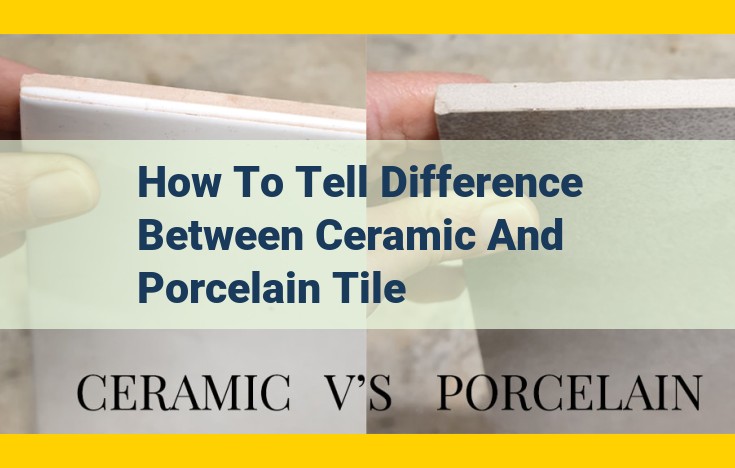Differentiate ceramic from porcelain tiles by examining their characteristics: ceramic tiles have higher water absorption, lower hardness, and density, while porcelain tiles exhibit the opposite. Their manufacturing processes differ; porcelain tiles undergo higher firing temperatures, resulting in denser and less porous tiles. Additionally, porcelain tiles come in glazed and unglazed varieties, while ceramic tiles offer a wider range including glazed, unglazed, rustic, and mosaic options.
Understanding Ceramic Tile Characteristics: A Comprehensive Guide
As you embark on your journey into the world of ceramic tiles, it’s imperative to grasp the key physical properties that define these versatile materials. In this guide, we’ll delve into the unique attributes that set ceramic tiles apart.
Water Absorption
Water absorption, measured as a percentage, indicates a tile’s capacity to absorb moisture. Tiles with low water absorption, such as porcelain tiles, are less susceptible to moisture penetration and staining, making them ideal for areas with high humidity or frequent water exposure.
Hardness
The hardness of a tile determines its resistance to scratching and wear. The Mohs scale, ranging from 1 to 10, is used to measure hardness. Ceramic tiles typically fall between 5 to 8 on the Mohs scale, providing good durability for residential and commercial applications.
Density
Density refers to the mass of a tile per unit volume. Dense tiles are heavier and more compact, offering greater strength and durability. Porcelain tiles are known for their high density, making them suitable for heavy traffic areas.
Porosity
Porosity measures the number of microscopic pores within a tile. Tiles with high porosity are more prone to absorbing water and stains. Ceramic tiles with low porosity are ideal for environments where hygiene and cleanliness are paramount.
Glaze
The glaze is a thin, glassy layer applied to the surface of ceramic tiles. It protects the tile from wear, moisture, and staining, and also enhances its aesthetics. Glazing techniques vary, creating diverse finishes, colors, and patterns.
Unveiling the Ceramic Tile Manufacturing Process
- Explore the steps involved in producing ceramic tiles, including clay preparation, firing temperature, and glazing techniques.
Unveiling the Ceramic Tile Manufacturing Process: A Behind-the-Scenes Journey
Step into the fascinating world of ceramic tile manufacturing, where humble clay transforms into exquisite and durable tiles that grace our homes and commercial spaces. The process is a symphony of artistry and science, each step carefully orchestrated to create tiles that endure the test of time and aesthetics.
Clay Preparation: The Foundation of a Tile
The journey begins with clay preparation. Raw clay is meticulously screened and blended, ensuring a uniform composition that will yield consistent tile properties. Water is added, creating a malleable mixture ready to be shaped into the desired tile forms.
Shaping the Tiles: Embracing Form and Function
Using advanced machinery, the clay mixture is pressed or extruded into various shapes and sizes. These tiles are then dried under controlled conditions to remove excess moisture, increasing their strength and reducing shrinkage.
Firing the Tiles: Heat-Induced Transformation
The drying tiles embark on a crucial step: firing. They are placed in large kilns and heated to temperatures exceeding 1000 degrees Celsius. This intense heat transforms the clay into a durable and water-resistant ceramic material.
Glazing: Enhancing Beauty and Durability
Once fired, the tiles may undergo glazing. A liquid glaze is applied to the surface, adding color, texture, and additional protection. The tiles are then fired again at a lower temperature, fusing the glaze to the ceramic body and creating a glossy or matte finish.
Quality Control: Ensuring Excellence
Throughout the manufacturing process, rigorous quality control measures are employed. Tiles are inspected at each stage to ensure they meet strict standards for strength, durability, and aesthetic appeal.
Exploring the Diverse Tapestry of Ceramic Tiles: Unveiling the Art and Variations
In the realm of ceramics, tiles emerge as a versatile canvas for creativity and functionality. As you venture into the labyrinth of available options, discover the myriad types of ceramic tiles, each possessing unique characteristics that cater to various design visions and practical needs.
Glazed Ceramic Tiles: A Glossy Symphony of Colors
Glazed ceramic tiles, adorned with a vitreous layer of glaze, radiate an elegant shimmer that transforms spaces with their iridescent beauty. Their impenetrable surface renders them exceptionally resistant to moisture and stains, making them an ideal choice for bathrooms, kitchens, and other high-traffic areas.
Unglazed Ceramic Tiles: Earthy Elegance with a Natural Touch
In contrast to their glazed counterparts, unglazed ceramic tiles embrace the raw charm of their natural clay composition. Their matte finish exudes an earthy elegance, providing excellent slip resistance and a timeless appeal that complements both rustic and contemporary aesthetics.
Glazed Porcelain Tiles: A Symphony of Strength and Style
Glazed porcelain tiles, renowned for their exceptional durability, withstand even the most demanding environments with aplomb. Their impervious nature to moisture makes them ideal for outdoor applications, while their polished or matte finishes offer a wide range of stylistic options.
Unglazed Porcelain Tiles: Rugged Charm for Heavy-Duty Applications
Unglazed porcelain tiles, boasting unrivaled strength and resilience, are the go-to choice for commercial spaces and industrial settings. Their ability to withstand heavy wear and tear ensures longevity in even the most challenging environments, while their non-slip texture prioritizes safety.
Rustic Ceramic Tiles: A Touch of Nature’s Charm
Rustic ceramic tiles, infused with the earthy allure of their natural inspiration, bring a touch of rustic charm to any space. Their imperfect edges and textured surfaces evoke the character of aged cobblestones, adding warmth and depth to indoor and outdoor settings alike.
Mosaic Ceramic Tiles: A kaleidoscope of Creativity
Mosaic ceramic tiles, composed of smaller individual pieces meticulously arranged in intricate patterns, unleash boundless creative potential. Their versatility extends from walls to floors, allowing for the creation of stunning accents, custom murals, and eye-catching designs that add a touch of artistic flair to any environment.
